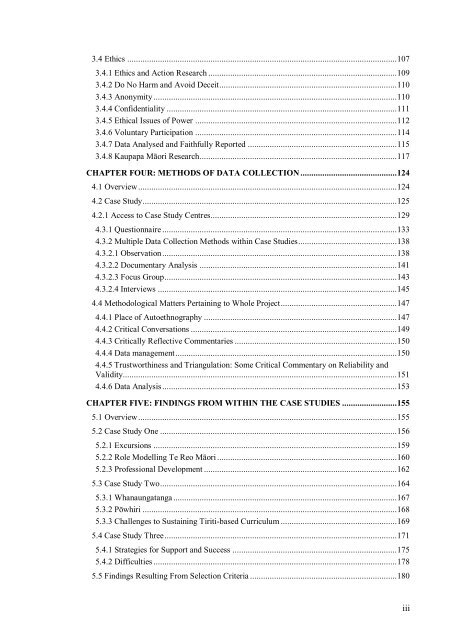supporting tiriti-based curriculum delivery in mainstream early ...
supporting tiriti-based curriculum delivery in mainstream early ...
supporting tiriti-based curriculum delivery in mainstream early ...
You also want an ePaper? Increase the reach of your titles
YUMPU automatically turns print PDFs into web optimized ePapers that Google loves.
3.4 Ethics ........................................................................................................................... 107<br />
3.4.1 Ethics and Action Research ...................................................................................... 109<br />
3.4.2 Do No Harm and Avoid Deceit ................................................................................. 110<br />
3.4.3 Anonymity ............................................................................................................... 110<br />
3.4.4 Confidentiality ......................................................................................................... 111<br />
3.4.5 Ethical Issues of Power ............................................................................................ 112<br />
3.4.6 Voluntary Participation ............................................................................................ 114<br />
3.4.7 Data Analysed and Faithfully Reported .................................................................... 115<br />
3.4.8 Kaupapa Māori Research .......................................................................................... 117<br />
CHAPTER FOUR: METHODS OF DATA COLLECTION ............................................ 124<br />
4.1 Overview ...................................................................................................................... 124<br />
4.2 Case Study .................................................................................................................... 125<br />
4.2.1 Access to Case Study Centres..................................................................................... 129<br />
4.3.1 Questionnaire ........................................................................................................... 133<br />
4.3.2 Multiple Data Collection Methods with<strong>in</strong> Case Studies ............................................. 138<br />
4.3.2.1 Observation ........................................................................................................... 138<br />
4.3.2.2 Documentary Analysis .......................................................................................... 141<br />
4.3.2.3 Focus Group .......................................................................................................... 143<br />
4.3.2.4 Interviews ............................................................................................................. 145<br />
4.4 Methodological Matters Perta<strong>in</strong><strong>in</strong>g to Whole Project ..................................................... 147<br />
4.4.1 Place of Autoethnography ........................................................................................ 147<br />
4.4.2 Critical Conversations .............................................................................................. 149<br />
4.4.3 Critically Reflective Commentaries .......................................................................... 150<br />
4.4.4 Data management ..................................................................................................... 150<br />
4.4.5 Trustworth<strong>in</strong>ess and Triangulation: Some Critical Commentary on Reliability and<br />
Validity............................................................................................................................. 151<br />
4.4.6 Data Analysis ........................................................................................................... 153<br />
CHAPTER FIVE: FINDINGS FROM WITHIN THE CASE STUDIES ......................... 155<br />
5.1 Overview ...................................................................................................................... 155<br />
5.2 Case Study One ............................................................................................................ 156<br />
5.2.1 Excursions ............................................................................................................... 159<br />
5.2.2 Role Modell<strong>in</strong>g Te Reo Māori .................................................................................. 160<br />
5.2.3 Professional Development ........................................................................................ 162<br />
5.3 Case Study Two ............................................................................................................ 164<br />
5.3.1 Whanaungatanga ...................................................................................................... 167<br />
5.3.2 Pōwhiri .................................................................................................................... 168<br />
5.3.3 Challenges to Susta<strong>in</strong><strong>in</strong>g Tiriti-<strong>based</strong> Curriculum ..................................................... 169<br />
5.4 Case Study Three .......................................................................................................... 171<br />
5.4.1 Strategies for Support and Success ........................................................................... 175<br />
5.4.2 Difficulties ............................................................................................................... 178<br />
5.5 F<strong>in</strong>d<strong>in</strong>gs Result<strong>in</strong>g From Selection Criteria ................................................................... 180<br />
iii
















